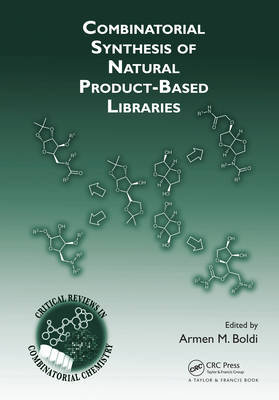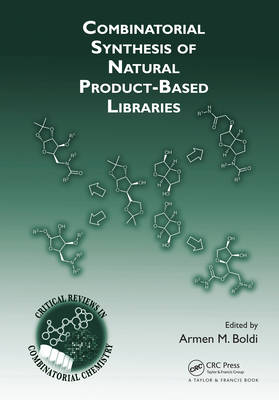
- Afhalen na 1 uur in een winkel met voorraad
- Gratis thuislevering in België vanaf € 30
- Ruim aanbod met 7 miljoen producten
- Afhalen na 1 uur in een winkel met voorraad
- Gratis thuislevering in België vanaf € 30
- Ruim aanbod met 7 miljoen producten
Combinatorial Synthesis of Natural Product-Based Libraries
€ 83,95
+ 167 punten
Omschrijving
Traditionally, the search for new compounds from natural products has been a time- and resource-intensive process. The recent application of combinatorial methods and high-throughput synthesis has allowed scientists to generate a range of new molecular structures from natural products and observe how they interact with biological targets. Combinatorial Synthesis of Natural Product-Based Libraries summarizes the most important perspectives on the application of combinatorial chemistry and natural products to novel drug discovery. The book details the latest approaches for implementing combinatorial research and testing methodologies to the synthesis of natural product-based libraries. Interconnecting the important aspects of this emerging field through the work of several leading scientists, it covers the computational analysis of natural molecules and details strategies for designing compound libraries, using bioinformatics in particular. The authors describe numerous synthetic methods for producing natural products and their analogs, including engineered biosynthesis and polymer-supported reagents. They also discuss additional considerations for generating libraries, such as screening, scaffolding, and yield optimization. Other chapters examine specific classes of libraries derived from natural products including carbohydrates, polyketides, peptides, alkaloids, terpenoids, steroids, flavonoids, and fungal compounds. Drawing attention to the interplay of drug discovery, natural products, and organic synthesis, Combinatorial Synthesis of Natural Product-Based Libraries contains the most recent and significant methods used to search and assess new compounds for their ability to mitigate biological processes that may lead to improved treatments for various diseases.
Specificaties
Betrokkenen
- Uitgeverij:
Inhoud
- Aantal bladzijden:
- 362
- Taal:
- Engels
- Reeks:
Eigenschappen
- Productcode (EAN):
- 9780367453626
- Verschijningsdatum:
- 2/12/2019
- Uitvoering:
- Paperback
- Formaat:
- Trade paperback (VS)
- Afmetingen:
- 178 mm x 254 mm
- Gewicht:
- 679 g

Alleen bij Standaard Boekhandel
+ 167 punten op je klantenkaart van Standaard Boekhandel
Beoordelingen
We publiceren alleen reviews die voldoen aan de voorwaarden voor reviews. Bekijk onze voorwaarden voor reviews.









